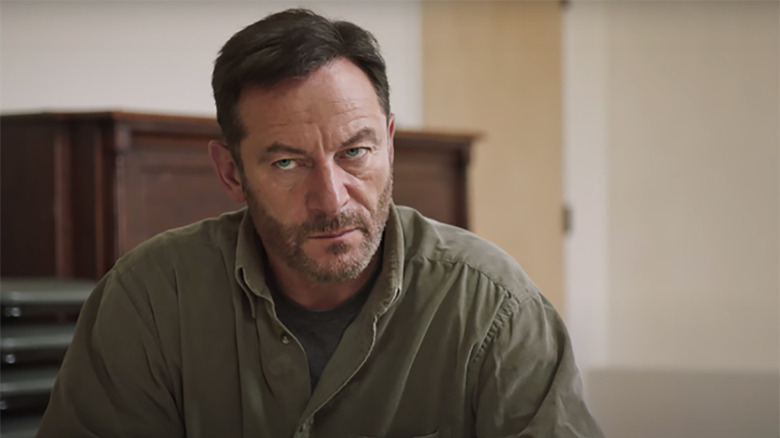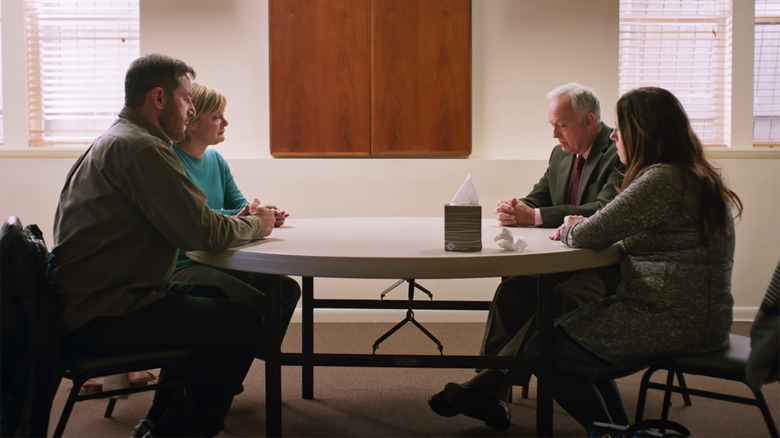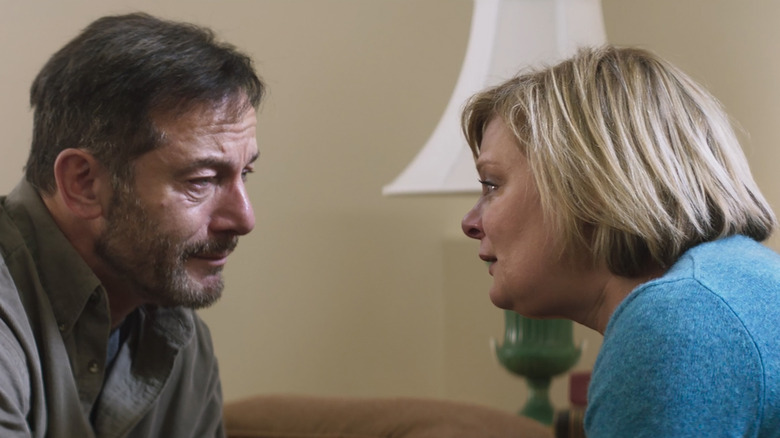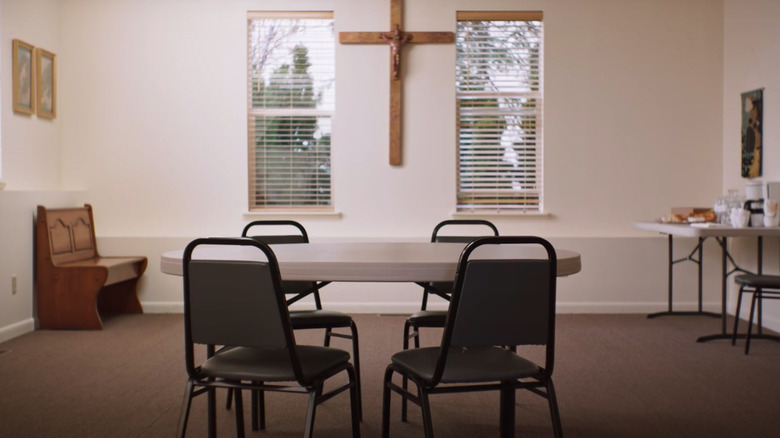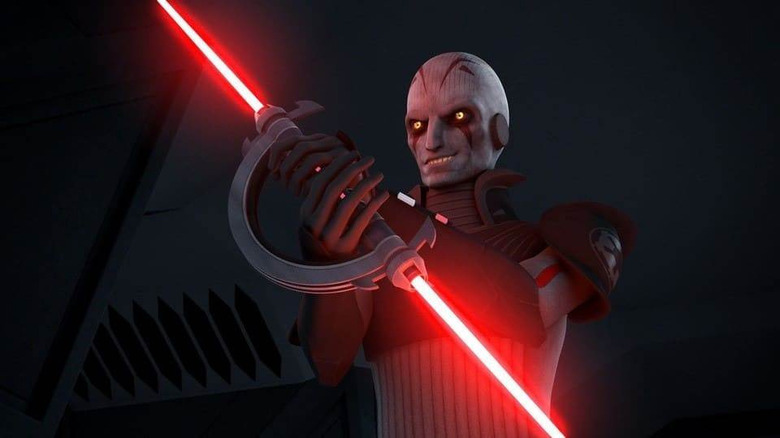Jason Isaacs Thought Mass Was 'Never Going To Be A Film' Despite An 'Extraordinary Experience' Making It [Interview]
"Mass" is a new drama marking the feature directorial debut of "Cabin in the Woods" actor Fran Kranz. The film played at the 2021 Sundance Film Festival earlier this year and arrived in select theaters in New York and Los Angeles this past weekend before it expands to more locations in the coming weeks. I cannot implore you enough to seek out this movie as soon as it's playing anywhere near you.
To coincide with the film's release, we spoke with actor Jason Isaacs ("Harry Potter," "Sex Education") about his role in the powerful drama as Jay, a father who lost his son in a school shooting some time ago. Jay and his wife Gail (Martha Plimpton) are meeting with Linda (Ann Dowd) and Richard (Reed Birney), the parents of the shooter, and the conversation they have inside of a quiet church's meeting room is full of tension, heartbreak, and immense pain.
During our interview, Isaacs discusses how the small ensemble cast prepared for the shoot and tapped into the lives of these characters who couldn't feel more tragically real despite not being directly based on any actual people who have suffered such a nightmare. The actor also talks about how his process of acting in a movie like "Mass" isn't much different from his role as Lucius Malfoy in the "Harry Potter" franchise. Then, unfortunately for us, he refuses to answer any questions about a possible future in "Star Wars," but he loves hearing that he's one of only two actors to ever voice both Superman and Lex Luthor.
"I left thinking, 'Well, that's never going to be a film.'"
I saw first saw "Mass" during the virtual Sundance Film Festival and wanted to see it again just for good measure before I talked to you and Fran Kranz. I absolutely loved it. And I just wanted to start off by finding out how you came to be involved with the movie.
Jason Isaacs: Well, Fran thinks that he got an email from my agent saying that I'd read the script and loved it. I think I got an email from my agent saying, "Fran would really like to meet you." I think somebody arranged it. I got involved. I read it and thought it was both magnificent and a fool's errand, because, clearly, no one was ever going to make a film like this. And it was an impossible task to make something watchable about four people in a room, but I couldn't take my eyes off it. I couldn't stop turning the pages. I read it in Starbucks. I was sobbing and heaving at the end. I felt both drained and smelling the flowers. I felt like the world was a better place and the possibility of change was in the air. And I looked up, and they were on the edge of calling the police, I think. I thought, well, I don't know what this is going to be like. This seems like an insane adventure, but I'm in.
We made this thing, and it was an insane adventure. It was incredibly emotional and very intense and never ending. We kind of stayed in this bubble for two weeks. When I left, and I don't mind saying it now because the film is such a huge success critically, but I left thinking, well, that's never going to be a film. We had such an extraordinary experience making it. We all went to places we never had gone to before. I didn't know what just happened. It felt like it was some kind of blackout, but I didn't think, I didn't dare hope, that it would end up being as powerful an experience for audience members as it had been for us making it. And it turns out that it is.
I think that's a testament to all four of you putting in these incredible performances. What was the process like preparing with your co-stars for such an intimate movie? What was the preparation like before you started shooting to really get into such an emotionally trying place?
I know that Martha insisted to Fran that there were some rehearsals, and then I had to screw that up, because I needed to go to Australia to make "Streamline." So we only had two days in New York. The plan was, I suppose, to go through the script, and I don't know what it was, because the plan just got kicked into touch, because we got there and we needed to know each other. In order to do what's required in this film, we needed not to bring any of our normal bulls**t, no actor's shtick. It just needed to be honest, and to do that, you've got to trust each other. So we just started instantly peeling the layers away and, I think, Ann got the ball rolling and told us what was happening in her life, which was quite trying at the time.
We all did that, and we just needed to really see each other and feel safe so that we could go to such extreme places. We did a little bit of work on the script, not really much. When I say work, it was Fran saying, "Is there anything you're not comfortable with? Is there anything that you don't buy? You just don't think it's truthful?" Which is a very generous thing for a man who had lived with the script for three years to do, to give agency to strangers who have just come in contact with it. But we all said, "Yeah, actually." And I said, "I don't think Jay would let any of this stuff happen here. It just shut them up. And I think he would want to talk about that." And Martha went, "Well, I'd want him to shut the f**k up if he said that."
"The cameras can see when you're lying, and he wanted us to believe what we were doing."
All this stuff ends up being in the script, because Fran is such a smart director. It wasn't that he thought we had great ideas. It was less relevant than that. We were taking ownership. The cameras can see when you're lying, and he wanted us to believe what we were doing. So that's what we did. Then, when we were in Idaho, I landed from Australia, and we went straight into filming. Martha and I spent every minute that we weren't on screen trying to build the offscreen life that is referred to, the offscreen life that's gone so badly wrong.
Right.
To work out when we stopped talking to each other, or what we argued about when we had separate bedrooms, and what we did or didn't agree on about our daughter who had been so badly messed up. The fact that I'm away working all the time and campaigning. Could we bother to spend any time together anymore? Did we have sex anymore? I mean, it's just really building the details of our life. Then, specifically, when she had started going to the therapist that made this meeting happen, what that therapist had told her to say, and whether I been dragged into therapy, or whether I volunteered for therapy, or whether I forced myself to go.
So when we built that world, and the hot topics, the things that we weren't allowed to say to each other, and the subjects that we weren't allowed to touch, and things we were meant to say, then the scenes themselves could unfold. We had such a rich history and texture. We could look at each other, and we both knew what the other one was thinking. We could make a gesture to each other, and it means, "Shut up, you're not meant to say that." We even did things like all the moments we had at home. The one point I raised with Ann and Reed's character, the notion that maybe their son, genetically, there was something wrong with him and stuff. That stuff I've run by Martha. My character tried at home and she screamed it down. She shut it down. She wasn't interested. So I'm looking for an ally the way couples do when they're out with other couples.
Yeah, absolutely.
So everything we did was about building that history and then not planning. Letting everything go, all of our many collective hundreds of years of acting, just leaving it all at the door and letting the scene take us wherever they wanted to and just really not planning anything.
"The best tribute I can pay to Fran's direction is that I don't remember it."
You can feel that and in the way that Fran shot this movie, because there are so many instances where just a simple expression on each of your faces, how you react to something that's said, it all got caught on camera, and they found it in the editing room. Is that something that you're conscious of, that you plan for part of the performance, or is that something that organically comes about just because you're so ingrained in the character in that moment?
Well, the best tribute I can pay to Fran's direction is that I don't remember it. I don't remember it, any cameras being in the room. I don't remember Fran being in the room.
That's great.
Of course, he was there. And, of course, he did come in and give notes, but my memory is of trying to manage my wife and her fury, and the fact that I thought she was going to do all the talking and she won't do it. My memory is of what I'm trying to persuade these two people on the other side of the table to say, or think, and how when they're not doing it, how upset I got. None of us were really aware of what the camera was or wasn't picking up. We were just living it, trying as best we can to live it and feel it as truthfully as we can. It was up to Fran what he picked up.
How does making a movie that's as intimate as "Mass" compare to something like working on a major movie, like the "Harry Potter" franchise? Do you prefer one over the other? Is the process any different?
"No, it's exactly the same. It's just, in "Harry Potter," sometimes you're working five minutes or two hours a day or something, and this one you're on camera, essentially, from the second the sun comes up in the morning 'til it's too dark to shoot. But they're both about telling stories. Oddly, although I've been in things which required one or two dimensions from me, in "Harry Potter," Lucius Malfoy is a very complicated character. He's an old-fashioned racist. He's the guy that thinks things were better when people like him ruled the world and that naive, meddling, progressive fools are upending the natural order of things, because he's scared he's going to be left behind. He's trying to make Hogwarts great again. This is a guy who thinks he's a savior.
So I'm playing a complex character. The difficulty on a set like "Harry Potter" is that there's an awful lot of waiting around. When you finally get to go down and shoot for a little bit of time, those few moments will be in the film, and you've had four hours sitting in a trailer. With "Mass" it's morning 'til night. But, really, they're the same job. Try and tell your story truthfully.
"I can't even acknowledge the existence of Lucasfilm as a real entity."
Speaking of the villains that you've played before, you played The Inquisitor in "Star Wars Rebels," so have there been any conversations with Lucasfilm about that character potentially coming into live action?
I can't even acknowledge the existence of Lucasfilm as a real entity. I've signed so many NDAs. Even having this conversation with you now I have to come round and cut your tongue out while you're sleeping. I apologize.
I mean, hypothetically, if that were to happen, have you thought about what —
There are no hypotheticals. This conversation is to be entirely avoided.
[Note: Jason Isaacs was being very playful in his tone when answering in this way]
[laughs, pees pants] Fair enough! Well, let me ask you something else then. Did you know that you're one of the only two actors to voice both Lex Luther and Superman?
I did not know that. I love that. I love the whole DC Universe. I've been Ra's al Ghul. I think I've been the Green Lantern. I think I've been, jeez, who else have I been? A whole bunch of stuff. I've loved all the things I've done in the DC Universe.
So you've loved playing in the DC Universe. Do you have any interest in crossing over into Marvel territory at all?
You know what I don't have is a plan for anything. I know where I'm going tomorrow. I'm going back to England to promote Mass for a couple of days then I'm going to Toronto to make "Good Sam" for six months. Then I have no idea what's happening. Of course, I love and I grew up on, Marvel. I had Marvel and DC Comics lining my bedroom, and the more obscure the better. In fact, I got them on Sundays. We would go and get fish and chips, obviously, the English national dish, and next goal was a candy store that sold secondhand Marvel and DC comics. So they weren't in order. My dad let me go and buy a bunch every week for like 10p, but they were never sequential. So I pieced together, jigsaw-like, the stories of all the different characters with huge gaps and the wrong chronology.
I tell you now, in my adult life, I realized how badly wrong I got the stories. But I absolutely love that world, and I love watching the films as well. I'm thrilled that there is room for films, the opposite kind of films, small, powerful, emotional adult dramas to be made as well. It would be a shame for the world if there were only giant special effects, superhero movies, but I absolutely lap them up. I adore them. I think Marvel, particularly, with Kevin Feige at the helm, have done a fantastic job of making them continually entertaining and relevant and watchable.
Absolutely. Well, thank you so much for your time, Jason. I appreciate it. I'm looking forward to hopefully seeing you getting some major awards attention for this performance, because it's outstanding.
That's very kind, but I hope that the film keeps getting watched by lots of people. If it takes awards to do that, that'll be a great thing.
For more from "Mass," check out our interview with writer/director Fran Kranz over here.
